BESA Research Basic - Perpetual License - is an unparalleled and sophisticated EEG and MEG analysis software. Seamlessly integrating advanced algorithms, it offers comprehensive insights into brain activity, from source analysis to event-related potentials. BESA Research Basic features include ERP, source montages, ICA and fMRI artefact correction.
BESA Research 7.1 - Basic - Perpetual License
BESA Research stands out as an unparalleled and intuitive software equipped with efficient tools and scripts designed to preprocess raw or averaged EEG and MEG data for source analysis and connectivity examination. All crucial components of source analysis and imaging are conveniently consolidated into a single window, offering immediate access to a diverse array of tools. This seamless accessibility extends to modules such as source coherence/time-frequency and other analysis interfaces. BESA Research streamlines hypothesis testing, incorporating various source analysis algorithms encompassing cortical and volume imaging techniques, seamlessly integrating with MRI and fMRI. It features age-appropriate template head models (FEM) and facilitates the importation of individual head models (BEM and FEM) generated by BESA MRI, ensuring comprehensive functionality and ease of use. Elevate your research and clinical practice with precision, efficiency, and unparalleled depth of understanding.
BESA Research Basic features opening and review of nearly any EEG and MEG data file from a variety of different EEG and MEG systems (e.g., .BDF, .EDF, .EEG, .ERD, .XDF, .EDF, .CNT and many more). Raw data is directly read into BESA without any preprocessing to the data. Any data processing steps thereafter, such as digital filtering, artifact detection and correction, computation of correlation and spectral analysis are then saved into separate files. The raw data file stays untouched. All analysis steps can be performed easily with a few mouse clicks. It also features different display options to review and export your analysed EEG/MEG data.
Data import and export
- Direct readers for most EEG and MEG data file formats
- Import of user-defined file formats using a generic reader
- Data import / export to ASCII and binary files
- MATLAB interface for direct transfer of analysis results to MATLAB
Data processing
- Superior digital filtering: high, low, and narrow band pass, notch
- Interpolation from recorded to virtual and source channels
- Automated EOG and EKG artifact detection and correction
- Advanced user-defined instantaneous artifact correction
- Pattern detection and averaging by spatiotemporal correlation
Data review
- Easy and fast review of digital EEG and MEG data files
- Fast paging, tagging and selected viewing of epochs of interest
- DSA and event displays for a quick jump to relevant pages
- Additional selected and virtual artifact channels (EOG etc.)
- Linear and non-linear correlation between scalp and source channels
- Spectral analysis: FFT, DSA, power and phase mapping
- Independent Component Analysis (ICA): Decomposition of EEG/MEG data into ICA components that can be used for artifact correction and as spatial sources in the source analysis window
Comparison of BESA Research Packages
BESA Research is available in three different packages called BESA Research Basic, Standard and Complete which include the following features.
| Feature | BESA Research Basic | BESA Research Standard | BESA Research Complete |
| Review, 2D and 3D mapping, averaging, ERP analysis | ✓ | ✓ | ✓ |
| Standardized source montages including resting state networks | ✓ | ✓ | ✓ |
| ICA (SOBI and Extended Infomax) | ✓ | ✓ | ✓ |
| fMRI artifact correction | ✓ | ✓ | ✓ |
| Source analysis & imaging | ✓ | ✓ | |
| Cortical imaging on individual or averaged brain | ✓ | ✓ | |
| Brain atlases | ✓ | ✓ | |
| Source estimation using Bayesian statistics (SESAME) | ✓ | ✓ | |
| Time-domain beamforming | ✓ | ✓ | |
| User-defined source montages | ✓ | ✓ | |
| Atlas-based source montages and beamformer virtual sensor montages | ✓ | ✓ | |
| Individual BEM and FEM Models (created with BESA MRI) | ✓ | ✓ | |
| Age-appropriate realistic FEM models ranging from 0 years to 24 years | ✓ | ✓ | |
| Coherence, time-frequency analysis | ✓ | ||
| Time-frequency analysis using wavelets, multi-taper, or complex demodulation | ✓ | ||
| Time-frequency analysis in source space and sensor space | ✓ | ||
| DICS (Dynamic Imaging of Coherent Sources) | ✓ | ||
| Time-frequency domain beamforming | ✓ | ||
| Connectivity analysis using: Phase-Lag Index, Partial Directed Coherence, Granger Causality or Directed Transfer Function | ✓ | ||
| Connectome views in matrix or circular plots | ✓ |
System Requirements
To experience BESA Research at its full potential, we recommend using a computer with the following minimal system specifications:
- Operating system: Windows® 10, 7 (64-bit, touch not supported)
- Processor: 2GHz (minimum)
- RAM: 8GB (minimum); >16GB (recommended)
- Screen resolution: 1280x1024px (minimum); >1920x1080px (recommended)
- Graphics card supporting OpenGL 2.0 with 16 MB RAM or more
BESA Research License Types
BESA Research is available as either a perpetual license or a subscription license. Perpetual licenses have no expiry date and can be used indefinitely (features still restricted to the package). Subscription licenses are available in a 1-year or 4-year contract.

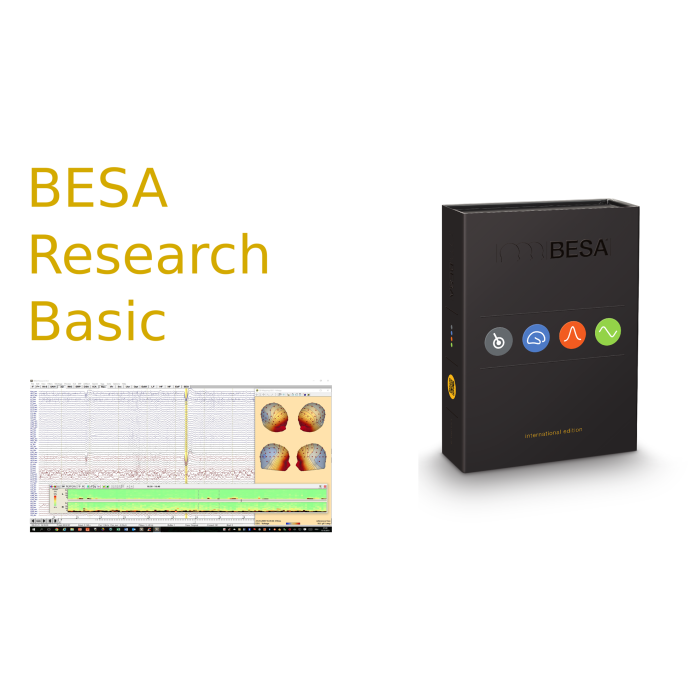

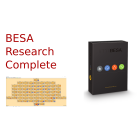
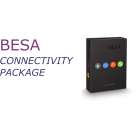
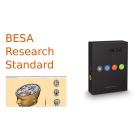
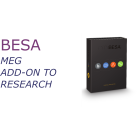
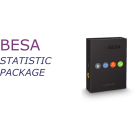
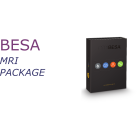
 Australia & New Zealand
Australia & New Zealand  Canada
Canada  European Union (EU)
European Union (EU)  France
France  Germany
Germany  Japan
Japan  Switzerland
Switzerland  USA
USA  International
International